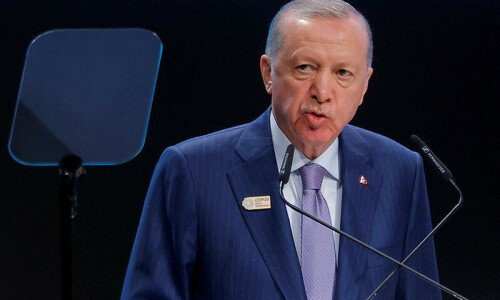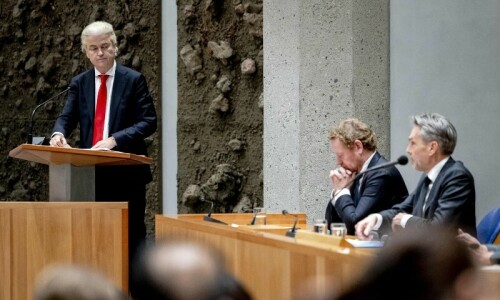BAGHDAD: A wave of attacks, most of them car bombs targeting Shia neighbourhoods of Baghdad, killed 33 people on Wednesday in the latest bout of deadly violence to hit Iraq.
The bombings and shootings, which left more than 70 people wounded in all, come amid a protracted surge in bloodletting just months ahead of general elections that has forced Iraqi officials to appeal for international help in combatting the country's worst unrest since 2008.
At least eight explosions, including seven car bombs, went off mostly against Shia Muslim neighbourhoods of the Iraqi capital from about 7:30 am (0430 GMT) onwards, leaving 28 people dead and more than 70 wounded, according to security and medical officials.
They come after similarly coordinated bombings in Baghdad on Sunday evening left 21 dead, and pushed the overall death toll for November above 300.
Wednesday's attacks occurred in areas ranging from the city's main commercial district of Karrada to the predominantly Shia neighbourhood of Shaab, as well as Sadriyah, one of Baghdad's oldest districts.
One car bomb also went off in the Sunni-majority neighbourhood of Adhamiyah in north Baghdad, the officials said. The blast in Karrada struck near a car dealership as Shia were gathering to mark the anniversary of the death of a venerated figure in Shia Islam, when Sunni militants often step up their attacks.
“We were cooking and giving food on the anniversary of the death of Imam Hussein,” said Ahmed Abu Ali, an employee of the Al-Baldawi car dealership.
“Many people were gathering at the dealership and suddenly a car blew up 20 metres away,” said the 40-year-old, clad in a traditional black Arab robe.
“Even if they bombed us and tried to stop us, we will not stop commemorating the anniversary of the martyrdom of Imam Hussein.”Security forces imposed tough measures in areas hit by attacks, in many cases barring journalists from filming video or taking photographs at bomb sites.
No group immediately claimed responsibility for the violence, but Sunni militants linked to Al-Qaeda's front group often set off coordinated bombings across Baghdad, typically targeting Shia, whom they regard as apostates.
In a separate attack in the normally-peaceful northern Kurdish city of Sulaimaniyah, gunmen assassinated Iraqi President Jalal Talabani's chief bodyguard, according to a police spokesman.
The trio of attackers entered Colonel Sarwat Rashid's home and shot him three times in the head in front of his wife, the spokesman said.
Authorities were still investigating the motive behind the attack.
Talabani has for nearly a year been recovering in Germany from a stroke and Rashid had been due to depart Sulaimaniyah to visit the president, for whom he had been head of personal security since 1994.
Multiple shootings in Baghdad and the main northern city of Mosul, along with a bombing in Abu Ghraib, left four others dead, while authorities near the restive city of Baquba found the bodies of three men who suffered gunshot wounds to the head and chest.
The unrest is part of a surge in bloodshed that has pushed violence to its highest level since 2008, when Iraq was recovering from the worst of its Sunni-Shia sectarian war.
Prime Minister Nuri al-Maliki has called for Washington's help in the form of greater intelligence sharing and the timely delivery of new weapons systems in an effort to curb the attacks, which officials fear are being driven by the ongoing civil war in neighbouring Syria.
But diplomats and analysts say the government is not doing enough to address the root causes of the unrest, particularly frustration within Iraq's Sunni Arab minority which alleges it is mistreated by the Shia-led authorities. With elections due on April 30, officials fear the level of violence could rise further as militants seek to destabilise the country ahead of the polls.
In addition to failing to stem the bloodshed, authorities have also struggled to provide adequate basic services such as electricity and clean water, and corruption is widespread.











































Dear visitor, the comments section is undergoing an overhaul and will return soon.